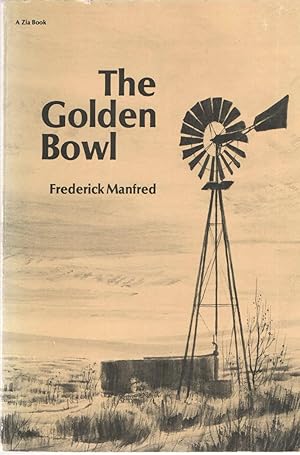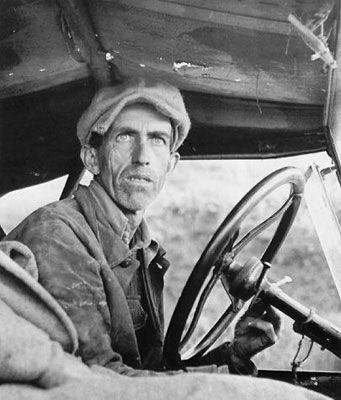
In what now seems another entire lifetime, I assigned students (lots of them, too) The Golden Bowl, the very first novel of Frederick Manfred, a living, regional writer I wanted them to read, not because I loved the novel, but because I wanted them to know the writer and to like him. I wanted them to understand literature as something very much alive, not a classroom exercise, the ramblings of dead white men. I didn't want them to think of American literature as the rarified province of schoolmarmish English teachers who loved speculating about vague, underlying themes. I wanted them to see what they were reading as a record created by ordinary people of the life they--and all of us--live.
I wanted them to experience what I had when I discovered Manfred, a yarn-spinner who told stories not all that different from the ones you could hear in a barber chair.
Forty years, something of a lifetime--it had been that long since I read The Golden Bowl.
Back then, I knew more about Fred Manfred than what I'd picked up from the novel. His Green Earth was just out, a sprawling chronicle of Siouxland life as he'd experienced it in the early years of the 20th century, as shocking in its realism as it was teeming with life. I knew he'd once crawled through the open prairie for hours in order to know what Hugh Glass had felt dragging his broken body a hundred miles back to a settlement. More than a decade had passed since I'd been seduced by The Secret Place, a sad Siouxland saga of love and loss. I knew Frederick Manfred more by reputation--"he writes dirty books"--than I did by the novels themselves.
The margin's scribbling was proof I'd read The Golden Bowl before, but I didn't remember my reactions of the story. Manfred's first novel is less deliberately autobiographical than some of the later Siouxland tales. Maury Grant hales from Oklahoma, not Siouxland. He's a pilgrim, he says, looking for work, as he has been for four long years since leaving his family's dusty disasters on the Southern plains.
He's heard there's work in the Black Hills' mines, so he's on his way through West River country in South Dakota, a "bindlestiff," he calls himself, a tramp living off whatever odd jobs he can pick up for food and fare, when he discovers the Thor family--or they discover him. He's lean and gaunt, but so are they--so is everyone. Think Dorthea Lange.

The land has not been kind. Abandoned places litter the northern plains. The brutal beauty of the Badlands now rises from most of South Dakota west of the Missouri. Maury can't help but admire Pa Thor's shiny-eyed idealism, his absolute trust things will get better; he's attracted by hope he considers misguided, and he enjoys their well-meant offer of a place, even their daughter Kristin's affection--if what happens between them can be called that.
Forty years ago I knew what was happening in The Golden Bowl. I knew that in the Thor family, the pilgrim Maury was slowly discovering something he'd lost; just as they looked at the stranger within their gates as the son they'd lost to misery all around. Soon enough, Grant calls the old man "Pa," who calls him "son." I knew that. The notes in the margins say it clearly.
What they don't say is that I had clue of the cosmic character of Maury's quest, or of the young Fred Manfred's determination this novel needed to be read in the company of sources that had given him life, sources in Shakespeare and the Bible and what not else.
I wanted my students, back then, to be introduced to a regional writer who grew up just down the road from the classroom. I didn't understand that a young novelist, writing in a sanitarium in 1942, had a different agenda, that the massive black roller in the final chapter of the novel isn't just a horrifying dust storm. Pardon the English teacher: that black day is what obscures us even when we return to hope, however seemingly futile, and love, whoever human.
Fred Manfred, just a kid when he wrote this his first novel, was deadly serious about Maury Grant. I didn't realize that, but I was just a kid myself.
There are more scribbles in 1976 University of New Mexico Press edition, scribbles my son carved on the page with a pen. It looks like I let him take a shot at the novel too. Back then, he was, at most, two years old. When I picked up the novel last week and found them again, I remembered him beside me, pen in hand.
I don't expect anyone to believe me, but this particular copy of Manfred's Golden Bowl is just another version of the panel in the broom closet where my mother periodically traced in her son's height when she knew he was growing.
I'm far too young to remember the Great Depression. I never choked on dust that blew in massively from Kansas or New Mexico, never had to shoot cattle or hogs whose very existence made my life or that of my family only more precarious. I didn't hitchhike through the Dakota version of the Dust Bowl, didn't look for work in the Black Hills, didn't find solace with a hardscrabble farm family whose only wealth was hope.
Forty years ago, when I made my students read The Golden Bowl, I liked the thought of assigning novel by a writer from just up the road. All those years later, reading it again was a different experience, because all those years later, I just loved the novel.


































